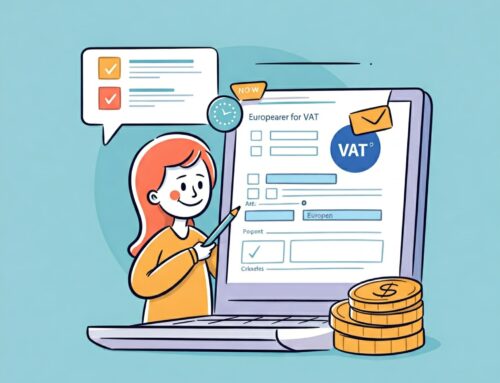This article has been written after the the substantial change in VAT regulation of July 2021.
What is OSS VAT?
Open Source Software Value Added Tax (OSS VAT) is a taxation system implemented by the European Union (EU) to ensure that non-EU companies providing digital services to customers in the EU are liable to pay value added tax (VAT). OSS VAT is applicable to companies that provide services such as hosting, online advertising, streaming services, and the sale of digital products such as downloads, subscriptions, and online gaming. The taxation regime is designed to ensure that digital services are taxed in the same way as physical goods and services, thus creating a level playing field for EU and non-EU companies.
Under the current OSS VAT system, non-EU companies are required to register for a VAT number in the EU country where their customers reside, and to charge, collect, and remit VAT from those customers. The rate of VAT applicable will depend on the country where the customer is located. For example, the standard VAT rate in the UK is 20%, but some countries such as Ireland have reduced rates of VAT. It is important for companies to ensure they are compliant with the OSS VAT regulations for the country in question in order to avoid penalties and non-compliance charges.
One of the most important aspects of OSS VAT is that it applies to cross-border transactions. This means that non-EU companies selling digital services to customers in the EU are liable to pay VAT, regardless of where the company is located. This has significant implications for companies based outside the EU, which may need to factor in the cost of VAT when setting their prices.
Another important feature of OSS VAT is that it applies to businesses of all sizes. Large companies selling digital services in the EU are required to pay VAT, as are small businesses and start-ups. This ensures a level playing field between all companies, regardless of size.
Given the complexities of OSS VAT, it is important for non-EU companies to understand the regulations in order to remain compliant and to ensure that their customers are not overcharged. Companies should seek professional advice to ensure they are compliant and to help them calculate the correct rates of VAT. It is also important to note that the regulations can change from time to time, so companies should ensure they keep up to date with the latest rules and regulations.
Selling in EU digital products, detailed article on VAT for digital services
Understanding the Requirements and Benefits of OSS VAT
Oss VAT, european union, digital services, non-eu companies
The European Union’s Value Added Tax (VAT) is a complex topic for non-EU companies selling digital services to EU customers. Understanding and leveraging the EU’s OSS VAT regulations is essential for providing a smooth, compliant, and cost-effective customer experience, while avoiding potential fines and other financial penalties.
OSS VAT stands for “One Stop Shop” Value Added Tax. It is a system that simplifies the process of calculating, collecting, and remitting VAT for digital services sold within the EU. This system enables non-EU companies to comply with the EU’s VAT regulations without establishing a physical presence in each EU country.
The benefits of OSS VAT are numerous. For non-EU companies, OSS VAT eliminates the need to register in each EU member state, saving time and money. Additionally, the OSS VAT system streamlines the process of calculating, collecting, and remitting VAT. This removes the burden of keeping track of different VAT rates and filing returns in multiple countries.
The requirements for OSS VAT are extensive. To use the OSS VAT system, non-EU companies must register for a VAT number in the EU country where their customers are located. This requires the company to provide information about the nature of their business, as well as other relevant information about the customer. Additionally, the company must be able to provide evidence of their compliance with the VAT regulations for each EU member state.
Overall, OSS VAT is a valuable tool for non-EU companies selling digital services to customers in the European Union. It simplifies the process of complying with the EU’s VAT regulations and provides numerous benefits, such as eliminating the need to register in each EU country and streamlining the process of calculating, collecting, and remitting VAT. However, non-EU companies must be aware of the requirements for OSS VAT before taking advantage of this system. Understanding the requirements and benefits of OSS VAT is essential for providing a smooth, compliant, and cost-effective customer experience.
How to Register for OSS VAT
Registering for OSS VAT
The introduction of the new OSS VAT (Online Sales Solutions for Value Added Tax) system has been a major breakthrough for non-EU companies looking to take advantage of digital services and sell in the EU. Under this system, these companies are able to register and pay VAT on sales made in the EU, helping them to access the lucrative European market.
Before registering for OSS VAT, it is important to understand the basics of the system. The OSS VAT system was developed by the European Union in 2019 in order to simplify the VAT process for non-EU companies. It is a single, unified system that allows companies to register and pay VAT on sales made in the EU.
The process of registering for OSS VAT is straightforward and easy to follow. The first step is to submit an application to the relevant tax office in the country where the company is based. This application should include information such as the company’s name, address, contact details, and the type of business. Once the application is approved, the company will be able to access the OSS VAT system.
Once the company has been approved for the OSS VAT system, the next step is to set up the VAT accounts. This involves setting up a separate VAT account for each country where the company sells its digital services. For each of these accounts, the company should enter the appropriate tax rate, as well as a description of the services being sold.
Once the accounts have been set up, the company will then be able to submit VAT returns. This process requires the company to provide detailed information about the sales they have made in each country, including the value of the services, the tax rate for each country, and the amount of VAT due.
Once the VAT returns have been submitted, the company will be able to access the OSS VAT system. This will allow them to view their VAT payments, as well as view any VAT refunds they may be entitled to. They will also be able to adjust their VAT rates to reflect changes in the law.
The OSS VAT system is a great way for non-EU companies to access the European market and take advantage of digital services. By following the steps outlined above, companies can easily register for and use the system to make sure their sales are compliant with all the necessary regulations.





